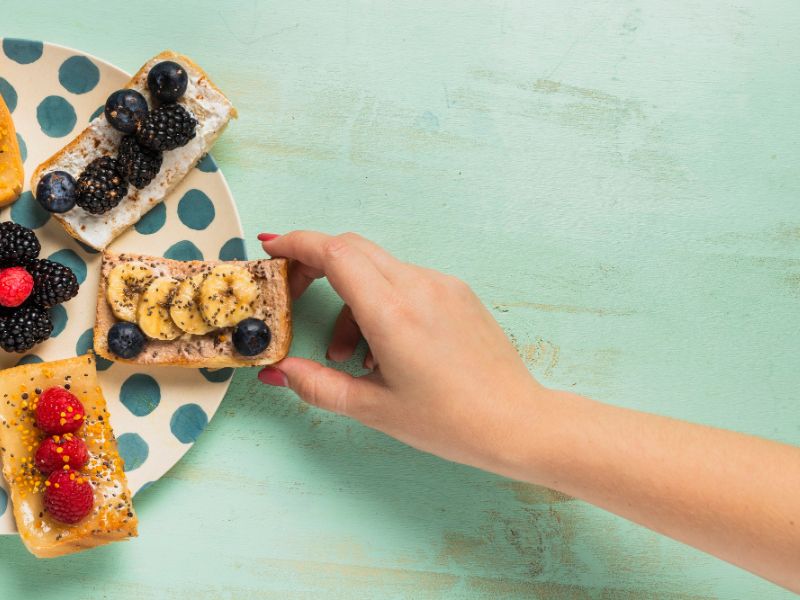 The list of dos and don’ts seems endless when you’re pregnant, especially when it comes to eating and drinking. Here, we offer advice on diet, supplements, nutrition-related pregnancy problems, and weight gain.
The list of dos and don’ts seems endless when you’re pregnant, especially when it comes to eating and drinking. Here, we offer advice on diet, supplements, nutrition-related pregnancy problems, and weight gain.
Some pregnant women become very concerned about what they should or should not eat during pregnancy, and well-meaning friends and relatives can often confuse matters with inaccurate or out-of-date information. That is the reason why the Eating for Pregnancy Helpline was established by WellBeing. The Helpline is based in the Centre for Pregnancy Nutrition at the University of Sheffield and is available to members of the public, health professionals such as midwives, and the media. It is open on weekdays from 10am to 4pm (there is also a 24-hour answerphone). Queries are also accepted via email.
During pregnancy it is important to make sure that your diet is providing enough energy (calories) and nutrients for the baby to grow and develop, and for your body to deal with the changes taking place.
 Foods to be encouraged
Foods to be encouraged
A healthy diet is based on carbohydrates such as bread, potatoes, and cereals, and is rich in fruit and vegetables. A healthy diet will include moderate amounts of milk and dairy products, meat, fish or meat/milk alternatives, and limited amounts of foods containing fat or sugar.
No single food can provide all the essential nutrients that the body needs. Therefore, it is important to consume a wide variety of foods to provide adequate intakes of vitamins, minerals and dietary fibre, which are important for health, including:
-
Plenty of fruit and vegetables (fresh, frozen, tinned, dried or a glass of juice). You should aim to eat at least five portions a day. Try to eat different-coloured fruit and vegetables to ensure that your body gets a variety of nutrients.
-
Meals and snacks based on starchy foods such as bread, pasta, rice and potatoes.
-
Two to three portions per day of protein foods, such as lean meat and chicken, fish (aim for at least two servings of fish a week, including one of oily fish), eggs and pulses (such as beans and lentils). These foods are also a good source of iron.
-
Large amounts of fibre. This helps prevent constipation and is found in wholegrain bread, pasta, rice, pulses and fruit and vegetables.
-
Two to three portions of dairy foods such as milk, cheese and yoghurt, which contain calcium. Low-fat dairy foods provide as much calcium as full-fat varieties.
Eating little and often may help to reduce feelings of nausea; healthy snacks include sandwiches or pita bread filled with cottage cheese, chicken or lean ham, low-fat yoghurts, vegetable and bean soups, and fruit including fresh, tinned in juice, or dried fruit such as raisins or apricots.
It’s also a good idea to cut down on foods such as cakes and biscuits, because these are high in fat and sugar. This can help you to avoid putting on too much weight during pregnancy.
Foods to be avoided
The following foods should be avoided because they can contain high levels of listeria, which can cause miscarriage, stillbirth or severe illness in a newborn baby.
-
Soft mould-ripened cheese, such as Camembert, Brie and blue-veined cheese. There is no risk of listeria with hard cheeses (such as Cheddar), cottage cheese and processed cheese.
-
Pâté (including vegetable). Tinned pâté is ok.
-
Uncooked or undercooked ready meals. Make sure ready-prepared meals are heated thoroughly until they’re piping hot all the way through.
When pregnant, it is also important to remember:
-
Eating raw eggs and food containing raw or partially cooked eggs should be avoided. Eggs should only be eaten if they have been cooked enough for both the white and yolk to be solid, to avoid the risk of salmonella food poisoning.
-
Always wash your hands after handling raw meat, and raw foods should be stored separately from ready-to-eat foods. This is to avoid other types of food poisoning from meat (salmonella, campylobacter and E. coli O157).
-
Only eat meat if it has been well cooked. Take particular care with sausages and minced meat.
-
Always wear gloves when gardening or changing cat litter, and wash your hands afterwards. This is to avoid toxoplasmosis, an infection caused by a parasite found in meat, cat faeces and soil, which can be harmful to unborn babies.
-
Excess amounts of the retinol (animal) form of vitamin A should be avoided. Vitamin A is essential for pregnancy, but too much in early pregnancy may be harmful to unborn babies. Pregnant women should avoid eating liver and liver products such as pâté. Vitamin A supplements (including high-dose multivitamins) or cod liver oil supplements should be avoided unless advised by a midwife or GP.
-
Limit your intake of oily fish, including fresh tuna, mackerel, sardines and trout, to no more than 2 portions of a week (canned tuna should be limited to 4medium-sized cans per week). This is because of potential contamination from environmental pollutants such as dioxins.
-
Avoid eating shark, swordfish and marlin. This is because of the levels of mercury in these fish. At high levels, mercury can harm a baby’s developing nervous system.
-
Avoid raw shellfish such as oysters and some types of sushi. Shellfish should only be eaten if they are cooked and part of a hot meal. This is because raw shellfish might be contaminated with harmful bacteria and viruses that could cause food poisoning.
-
Peanut allergy is increasing in children, although the cause is unclear. The use of peanuts and peanut oil in the British diet has increased rapidly over the last few years and it is thought that being exposed to peanuts at a young age may cause the allergy. Current advice is that if you, your partner or existing children have a history of asthma, eczema or food allergy, then you should avoid peanuts during pregnancy.
-
Limit your caffeine intake to 300mg per day, but it is not necessary to avoid it completely. Caffeine occurs naturally in a range of foods, such as coffee, tea and chocolate, and it is also added to some soft drinks and ‘energy’ drinks. High levels of caffeine have been linked with miscarriage and low birth weight. See Box 1 for the caffeine content of various foods. Remember that caffeine is also found in some cold and flu remedies, so always check with your midwife or GP or another health professional before taking any of these.
Alcohol
If you are pregnant or likely to become pregnant, you should limit your intake of alcoholic beverages to no more than 1 or 2 units once or twice per week. A unit is half a pint of standard strength beer, lager or cider, or a pub measure of spirits. A glass of wine is about 2 units and ‘alcopops’ are about 1.5 units.
Heavy drinking during pregnancy increases the risk of mental retardation, learning disabilities, and major birth defects, known as fetal alcohol syndrome.
Herbal remedies
Many pregnant women who would not consider taking over-the-counter medications often view herbal and botanical products as a safe and natural alternative. However, very few randomised clinical trials have examined the safety and efficacy of alternative therapies during pregnancy.
One clinical trial that examined ginger during pregnancy reported reduction in the symptoms of pregnancy nausea with treatment and no adverse effects. However, some questions remain about the absolute safety of very high intakes of ginger during pregnancy. Many other common remedies for nausea and vomiting, such as red raspberry, wild yam, and homoeopathic treatments, have not been formally studied.
Unfortunately, magazines, newspapers, and even some midwifery journals contain misguided information regarding many herbal products. Pregnant women should be advised to consider herbal treatments as suspect until their safety during pregnancy can be ascertained. It is recommended that you should limit the consumption of herbal teas by choosing herbal teas in filtered tea bags and limiting consumption to two 8-oz servings per day.
Common nutrition-related pregnancy problems
Nausea and vomiting
Nausea and vomiting or ‘morning sickness’ is one of the most common complaints among pregnant women, with around 80% of them experiencing it in the first trimester. Of these, 50% continue to report symptoms well beyond the first trimester.
Management of nausea and vomiting during pregnancy depends on the severity of the symptoms. Consuming small meals frequently, avoiding offensive odours, drinking enough fluids, and getting fresh air can often treat milder cases. Some pregnant women tolerate foods high in carbohydrate, such as crackers, better than high-protein or high-fat foods. Learn by experience which foods ease your nausea and eat those foods to avoid an empty stomach.
Hyperemesis gravidarum, or severe nausea and vomiting persisting beyond 14 weeks of pregnancy, is a high-risk condition usually requiring hospitalisation, medication, rehydration, correction of electrolyte or metabolic disturbances, and nutritional support.
Heartburn
During pregnancy, heartburn may occur as a result of the hormonal changes that slow the movement of food through the digestive tract. One or more of the following recommendations may ease heartburn in pregnancy: avoid lying down immediately after eating; sleep with the head slightly elevated to avoid acid reflux; consume small, frequent meals; and avoid known irritants, such as caffeine, chocolate, or highly-seasoned foods.
Constipation
Infrequent, or hard, dry stools may occur either as a side effect of high doses of supplemental iron or as part of the normal digestive changes during pregnancy. To alleviate symptoms, pregnant women may be advised to include high-fibre foods in their diet, increase fluid intake, and get regular physical activity.
Food cravings and aversions
Food cravings and aversions are very common during pregnancy. Some of the most commonly craved items are chocolate, citrus fruits, pickles, chips, and ice cream. The most common aversions are to coffee, tea, fried or fatty foods, highly spiced foods, meat, and eggs. Food cravings may be related to increased energy intakes, and aversions to reduced intakes.
‘Pica’ generally refers to the compulsive intake of non-food substances over a sustained period of time. ‘Geophagia’ specifically refers to compulsive eating of clay or dirt. Some women feel compelled to eat ice or freezer frost (pagophagia), laundry starch, soap, ashes, chalk, paint, or burnt matches.
However, abnormal craving for and intake of some food items, such as cornstarch or baking soda, are also considered examples of pica. Pregnant women who practise pica may be, as a result, exposed to lead or other environmental toxicants. Pica has also been associated with reduced iron levels in the mother and smaller head circumference in the infant. Pica was first addressed in a medical book in 1563, which described geophagia in pregnant women.
Nutrients that are particularly important for pregnancy
Folic acid
Folic acid, known as folate in its natural form, is one of the B-group of vitamins. Because it’s a water-soluble vitamin, it cannot be stored in the body, which means that it is important to eat foods that contain it every day.
Most people should be able to get the amount they need if they eat a varied and balanced diet (which many women in the UK do not find easy to achieve). Folic acid is found in small amounts in many foods. Good sources include broccoli and Brussels sprouts, peas, chickpeas, yeast extract, brown rice and some fruit such as oranges and bananas. Other useful sources include fortified breakfast cereals and some breads.
Folic acid supplements together with a folate-rich diet have been shown to reduce the risk of neural tube defects such as spina bifida. A daily 400-microgram folic acid supplement should be taken from the time of conception until the 12th week of pregnancy. Some women such as those who have already had a pregnancy affected by a neural tube defect, or who are taking anti-epilepsy medication, are recommended to take a higher dose, which is available on prescription.
Iron
Pregnant women are at increased risk of developing iron-deficiency anaemia, so eating plenty of iron-rich foods is advised. However, iron status is checked regularly during pregnancy, and if required iron supplements are recommended. Vitamin C helps the body to absorb iron, so include food or drink containing vitamin C, such as fruit or vegetables or a glass of fruit juice, with meals. Don’t drink tea or coffee with meals or iron supplements because these make it harder for the body to absorb iron. It’s best to wait at least half an hour after eating/taking iron supplements before having tea or coffee.
Vitamin D
The best source of vitamin D is summer sunlight. Women of Asian origin, or those who always cover up all their skin when outside, or those who rarely get outdoors, may be particularly short of vitamin D and should take a supplement containing 10 micrograms of vitamin D each day. Women who receive Income Support or Jobseeker’s Allowance are entitled to free vitamin D supplements from maternity and child health clinics.
Calcium
Good sources of the mineral calcium include milk, cheese and other dairy foods, green leafy vegetables (such as broccoli, cabbage and okra, but not spinach), soybean products, nuts, bread and anything made with fortified flour, and fish where the bones are eaten, such as sardines and pilchards.
A word on DHA
Docosahexaenoic acid (DHA) is essential for the growth and functional development of the brain in infants. DHA is also required for maintenance of normal brain function in adults. DHA is present in fatty fish (salmon, tuna, mackerel) and mother’s milk. It is also present at low levels in meat and eggs but not usually present in infant food formulas. If you are taking any supplements, including DHA, then let you doctor know.
Weight gain recommendations for pregnancy
Many pregnant women are very anxious about their weight. They may worry about putting on too much weight, and not being able to lose it afterwards, or about not gaining enough, and how this might affect their baby. In fact, women vary tremendously in the amount of weight they put on during pregnancy, and there’s no such thing as an ideal weight gain.
The weight gain is made up of baby, placenta, amniotic fluid, increased uterine muscle, enlarged breasts, extra blood, extra fluid and extra fat supplies (needed for making breast milk). Most weight is gained between 4 and 7 months, although for some women the pattern is quite different.
Historically in the UK a normal weight gain for most healthy women was considered to be 11–15kg (25–35lb), with younger, first-time mothers usually gaining more than older mothers. However, women can gain anything from almost nothing to up to 23kg, and still have a normal pregnancy and a healthy baby. A lot depends on pre-pregnancy weight, individual metabolism and physical activity levels. Pregnancy weight-gain advice in the UK is almost non-existent, and you may only be weighed once or twice, or not at all during your pregnancy.
During the 1980s evidence emerged that pregnancy outcome also had a complex relationship with maternal pre-pregnancy weight and height, or BMI. Ten years ago the Institute of Medicine (IOM) in the USA published comprehensive antenatal weight gain recommendations, which suggested that antenatal weight gain should vary according to BMI and that the lowest rates of perinatal mortality were associated with underweight women who achieved high weight gains and overweight women who achieved low gains.








